Students and professionals team up to produce documentary on Gen. Robert Neyland
Communications school follows up award-winning documentary with another exploring the life of famous University of Tennessee football coach Neyland.
Janel Shoun-Smith | 615.966.7078 |
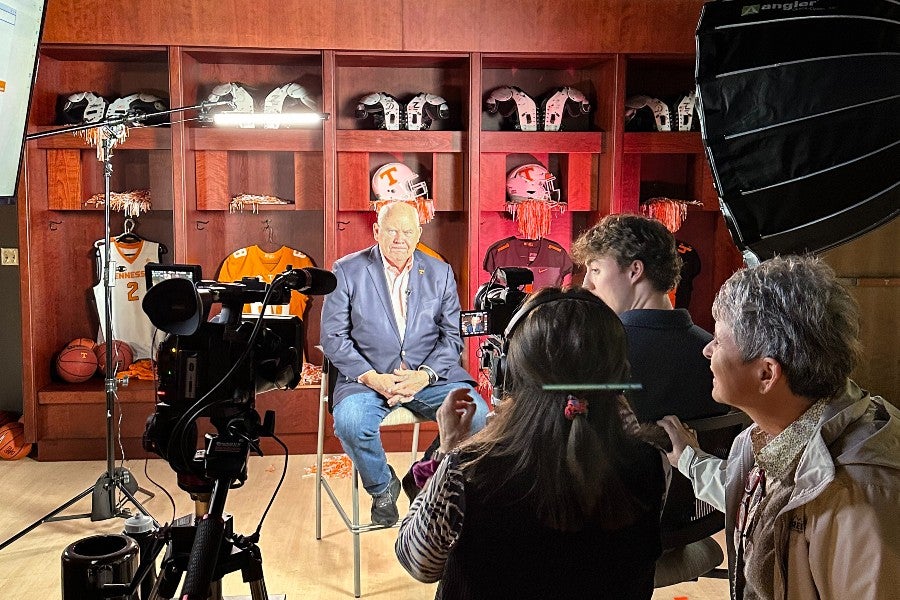
Lipscomb student Ben Barry interviews former Vols football coach Phil Fulmer with support from Lipscomb's journalism student Anastasiia Bolydreva and instructor Demetria Kalodimos.
In its first year of teaming up students with professional journalists on extracurricular projects, the School of Communication hit it out of the park with a national award-winning documentary on the Nashville Sounds baseball scoreboard.
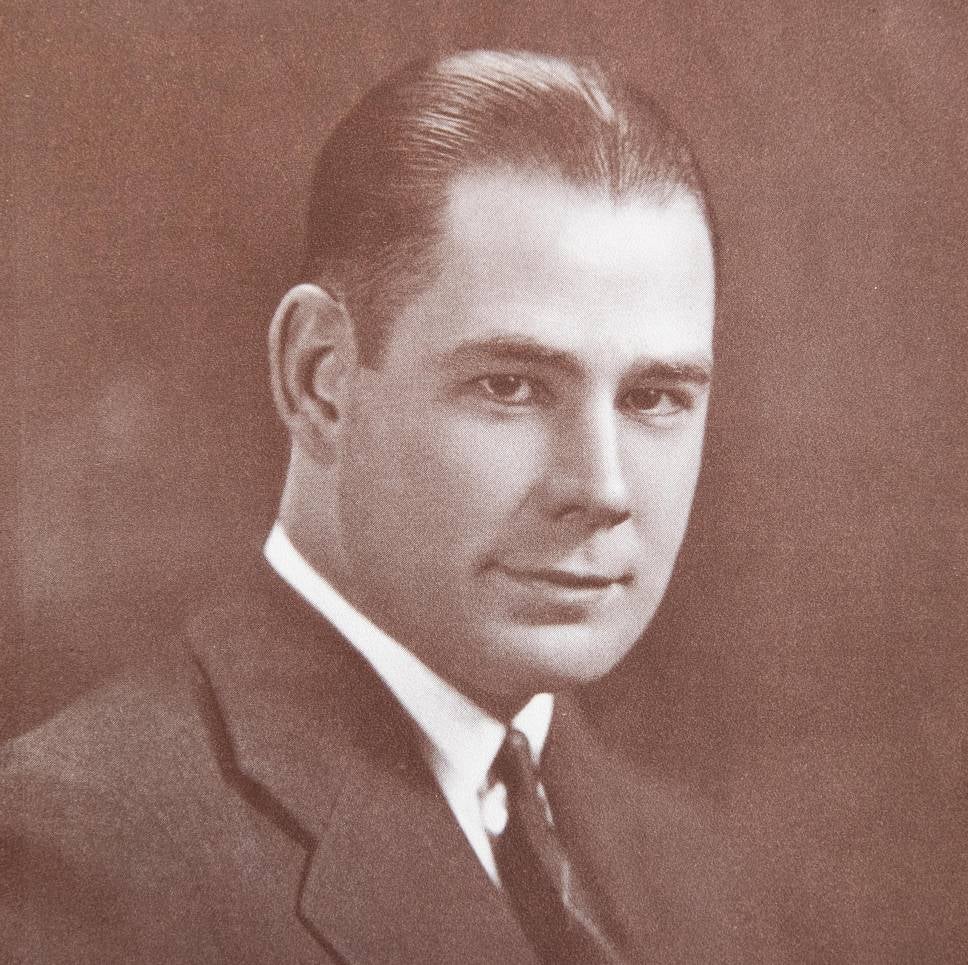
Gen. Robert Neyland
In 2024, another team is working on a second documentary on an even more well-known historic sports icon: Gen. Robert Neyland, legendary coach of the University of Tennessee Vols football team and namesake of the landmark Neyland Stadium.
Both projects were mentored by professional-in-residence and veteran journalist Demetria Kalodimos, who anchored and reported news for nearly 40 years and has won some of the top awards in broadcast journalism including 16 Emmys.
Throughout the spring semester, Kalodimos and students Ben Barry, Anastasiia Bolydreva and Paiton Walker have been researching aspects of Neyland’s life, carrying out video interviews with the last two members of any football squad coached by Neyland (who stepped down from coaching in 1952) and archiving Neyland family documents and photos.
The Lipscomb crew interviewed the last two living members of Neyland teams: James Haslam, who was the captain of Neyland’s 1951 championship team, father of former Tennessee Gov. Bill Haslam and founder of Pilot Corporation, one of the largest privately owned companies in the U.S.; and Mack Franklin of Hermitage, Tennessee. They have taken two trips to Knoxville to interview Haslam and Phil Fulmer, Vols football coach from 1992-2008, and also interviewed Neyland’s grandson Blake.
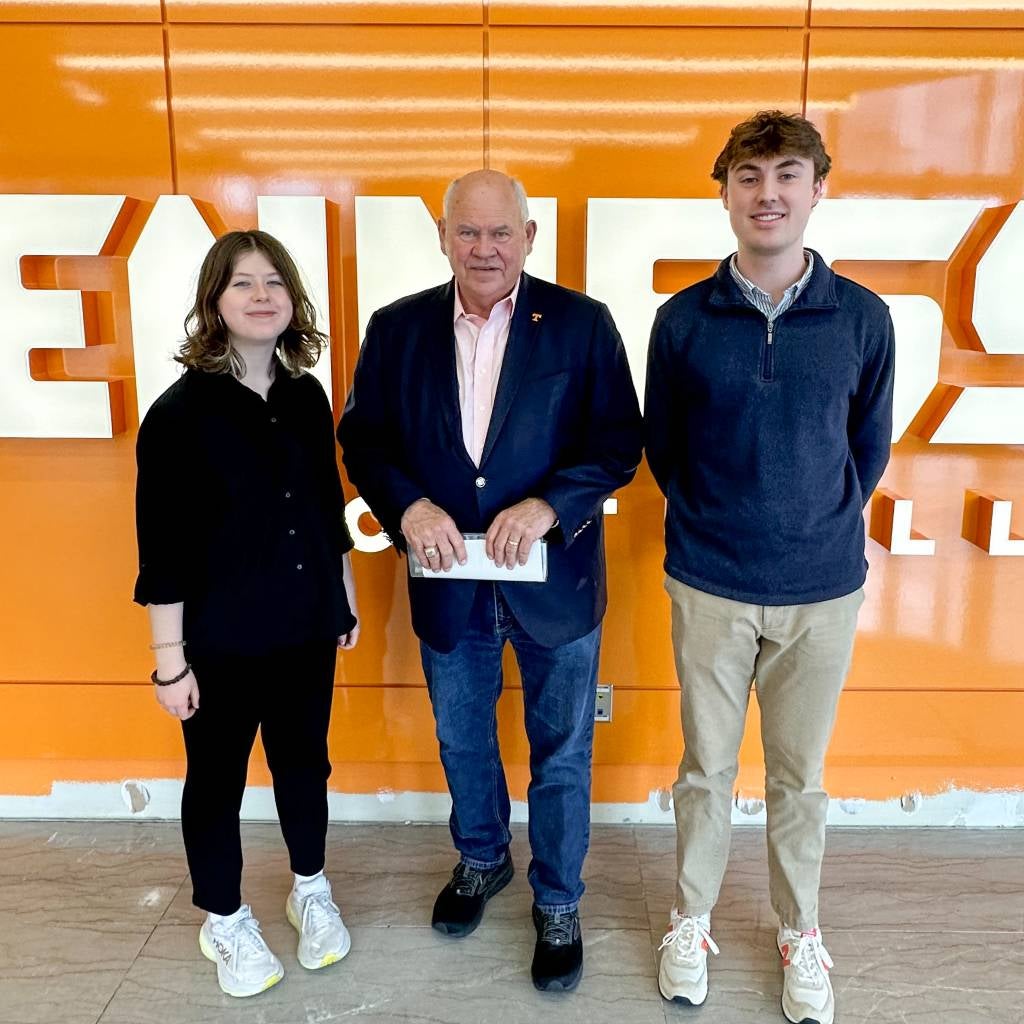
Anastasiia Bolydreva and Ben Barry with former Vols football coach Phil Fulmer.
“Ben is settled into the role of interviewer but is also learning some of the technology. Anastasiia is our budding videographer,” said Kalodimos. “We are locating old film footage through the National Archives, newsreels primarily, that featured big bowl games in the 1950s.”
“I've learned how to ask engaging questions and pace the questions during the interview to keep it feeling authentic and conversational,” said Barry, a junior sports media major from Lombard, Illinois. “I've learned how to think on my feet and ask follow-up questions on the spot to get better answers. I've been told many times by my professors and by Demetria that ‘good interviewers know how to ask questions, great interviewers know how to follow up’.”
Bolydreva, a junior journalism and new media major from Saint Petersburg, Russia, focuses on working the video equipment, including the lighting, which can often mean lengthy setup or arranging the equipment in a very tight space.
“It has been helpful to see how a documentary comes together and eye-opening to see how long and energy-consuming the process is,” she said. “I appreciate the opportunity to be a part of this team and see how journalism is done in real life.”
Faculty and students who presented at the Baseball Hall of Fame in 2022.
The Neyland project is the second impactful documentary project carried out by Lipscomb students. In spring 2022 Kalodimos and her student team of then-seniors Shawna Mann (BA ’23), Spencer Barnabee (BA ’22), Emma Shanahan (BA ’23) and Kahwit Tela (BA ’22) were accepted to present their documentary Grand Ole Guitar at the 33rd Cooperstown Symposium on Baseball and American Culture at the National Baseball Hall of Fame and Museum in Cooperstown, New York.
Later, in 2023, Grand Ole Guitar was one of only eight projects nationwide to receive a prestigious Edward R. Murrow Award, one of the most esteemed honors in the journalism industry. The Murrow Awards are the embodiment of the values, principles and standards set forth by Murrow, a journalism pioneer who set the standards for the highest quality of broadcast journalism.
The 18-minute documentary tells the story of the guitar-shaped scoreboard that was an icon for decades at Greer Stadium, former home of the Triple-A minor league affiliate Nashville Sounds.
“Guitar required quite a bit of research of visual elements, through the internet and the personal collections of those we located and interviewed, including photos and clippings etc,” said Kalodimos. “We were lucky enough to find a former Nashville journalist who had flown a drone over the original scoreboard before it was dismantled. That turned out to be visual gold.”
“The students were tasked with reaching out to potential interviewees, and we had sit downs with local baseball historian Skip Nipper, founder and former Sounds president Larry Schmittou and Cy Young Award winning pitcher R.A. Dickey,” explained Kalodimos.
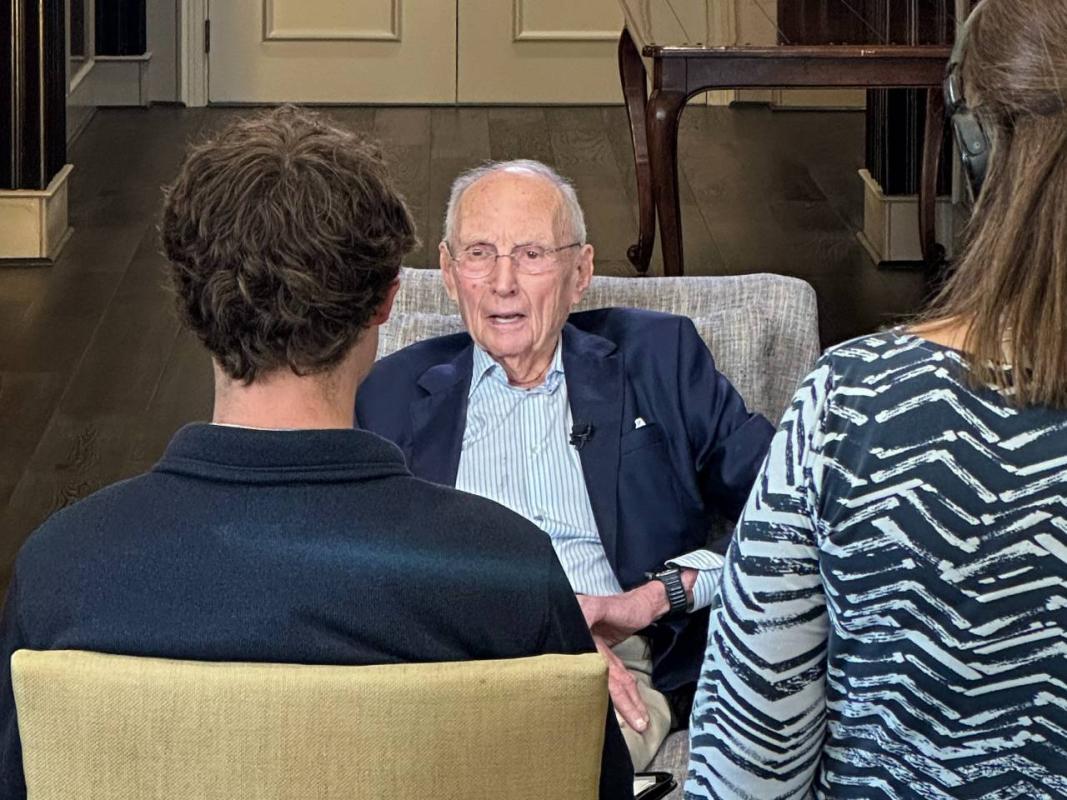
Ben Barry interviews James Haslam, a captain of Neyland’s 1951 championship team.
Students learned about the logistics involved such as securing clearances for locations and interview subjects. “The editing piece is also a learning experience as you have to invest about 10 hours of editing and production time per one minute of the final product,” said Kalodimos.
For both projects, Kalodimos enlisted the assistance of Jeff Wiltgen, former chief photographer at KARE-TV in Minneapolis, and Zina Bauman, an Emmy award winning videographer/editor and owner of Melody & Light Pictures in Nashville, who both volunteered their professional expertise and time to help students with the projects.
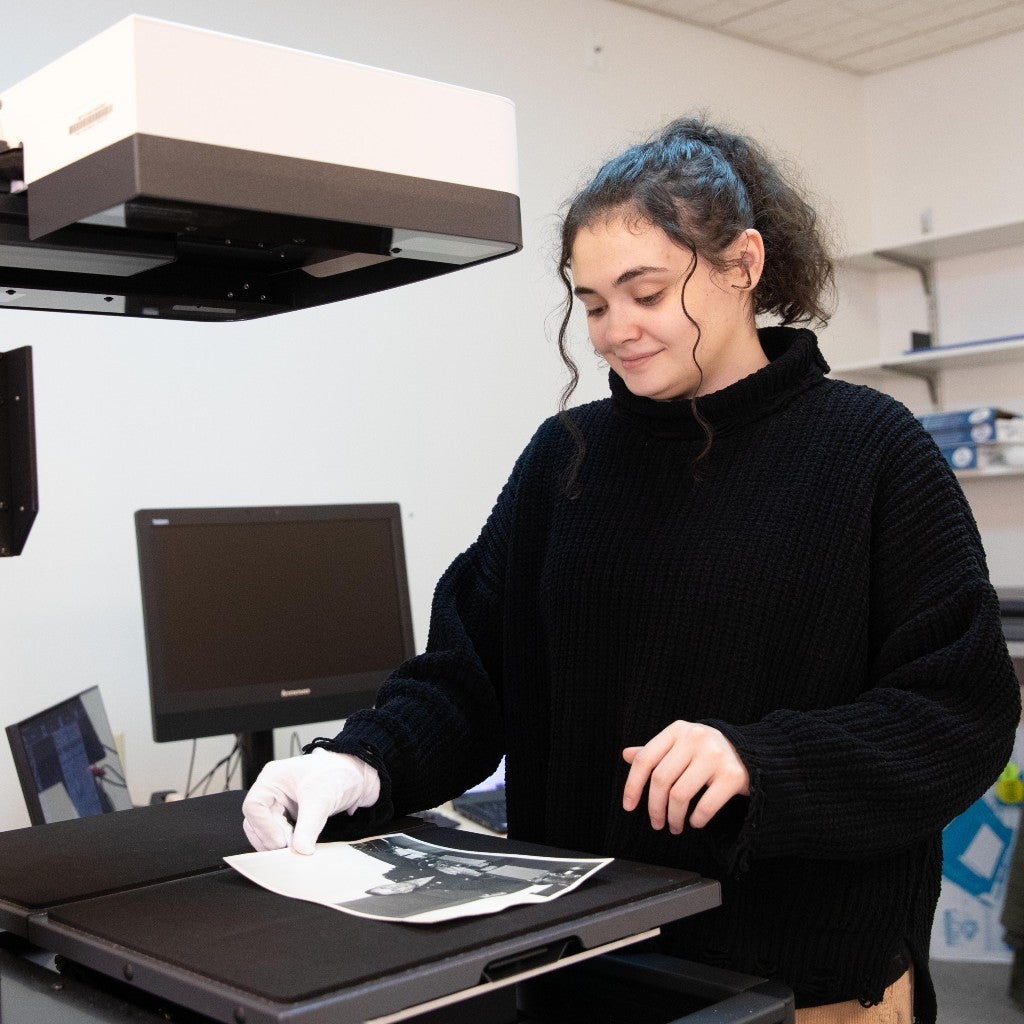
Paiton Walker archives a Neyland family photo.
Wiltgen helped students learn the basics of shooting a baseball game for Guitar and provided guidance on lighting and framing of shots for the interview segments for Neyland. Bauman made sure the interviews were lit correctly and ensured quality on important visuals. “I cannot underscore enough the value of working professionals helping to show students how to set up, tear down and be efficient in field work involving video,” said Kalodimos.
These two documentaries are models for the way the Department of Communication and Journalism continues to bring the latest in journalistic methods and technology to its students, said Sarah Gibson, professor and chair of the department.
The idea for the Neyland documentary was sparked by Lipscomb’s Tim Johnson, the Elizabeth Gentry Brown Chair in History, who has been providing historical consultation for the project.
There is only one book written on the life of Neyland, who actually excelled in two professions, said Johnson. In addition to being an iconic football coach, he also graduated from West Point, served in both World Wars, and rose to the rank of brigadier general.
Blake Neyland graciously provided a box of photos, clippings and letters that the family has held for years. Also, when he was interviewed for the documentary film, he brought along two of General Neyland's cadet jackets from West Point, coats that had been kept in pristine condition by a family friend and then gifted back to the Neyland family.
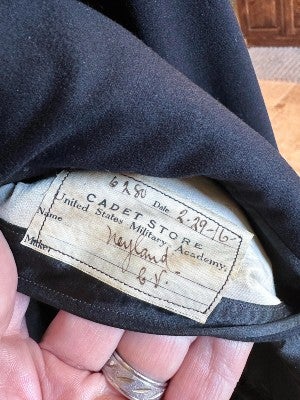
Two of General Robert Neyland's cadet jackets from his days at West Point were made available for use in the documentary.
Among the archival materials loaned from the family, were photos of Neyland as a cadet at West Point and in his West Point baseball uniform, where he was a star pitcher on the team. Student Walker, a senior in animation from White Bluff, Tennessee, has spent several months this spring “giving them the archival treatment,” said Johnson.
Walker first inventoried the items, measured all the photos and wrote descriptions of each piece to aid future researchers in finding them again, she said. Each item was put into a protective sleeve with the help of library student intern Emily Czap, a student in the IDEAL (Igniting the Dream of Education and Access at Lipscomb) program.
Walker plans to attend the University of Tennessee to obtain her master’s in library and archival work, so she has been excited to learn the history of Neyalnd’s life and career through this archival project.
“When you work on a project like this, one that's very specific, you get to know the subject in a very interesting way. It almost makes you feel like you're walking through history with them,” said Walker.